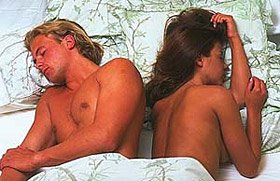 |
 |
 |
 Health & Beauty | August 2005 Health & Beauty | August 2005  
USFDA Delays Morning-After Pill Decision
 Lauran Neergaard - Associated Press Lauran Neergaard - Associated Press


| | USFDA delays decision on whether to sell morning-after pill without a prescription. |
Most women hoping to buy emergency contraception without a prescription will have to wait awhile longer. The Food and Drug Administration on Friday again postponed its long-awaited decision on whether to let the morning-after pill sell over the counter. It said it still hadn't determined how to ensure that only adults, and not young teenagers, used it without a doctor's guidance.

The FDA did say scientific evidence backed the safe nonprescription use of the pill, sold under the brand Plan B, by women 17 or older. But it called for 60 days of public comment on whether and how drug stores could enforce an age limit.

FDA Commissioner Lester Crawford said the agency "cannot have an inspector in every pharmacy."

The drug's maker, Barr Pharmaceuticals, criticized the decision, questioning how the agency could acknowledge that scientific evidence supported nonprescription sales and yet not allow those sales to begin.

"It's like being in purgatory," said Barr chief executive Bruce Downey.

The morning-after pill is a high dose of regular birth control that, taken within 72 hours of unprotected sex, can lower the risk of pregnancy by up to 89 percent. The sooner it's taken, the more effective it is. But it can be hard to get a prescription on weekends or holidays, and some pharmacists refuse to fill prescriptions.

Laws in seven states Alaska, California, Hawaii, Maine, New Hampshire, New Mexico and Washington already allow women to buy Plan B without a prescription, with no age restrictions. Massachusetts is set to become the eighth this fall, as lawmakers are expected to override their governor's veto of nonprescription sales.

FDA's delay doesn't affect Plan B sales in those states. But it marked Barr's latest disappointment in the two-year battle to sell Plan B without a prescription nationwide.

Contraceptive advocates and doctors groups say easier access could halve the nation's 3 million annual unintended pregnancies. FDA's scientists say the pills are safe, used by more than 2.4 million Americans and millions more women abroad with few side effects.

The agency's independent scientific advisers overwhelmingly backed over-the-counter sales for everybody, not just adults, in December 2003.

FDA rejected that recommendation, citing concern about young teens' use of the pills without a doctor's guidance. Barr reapplied, asking that women 16 and older be allowed to buy Plan B without a prescription while younger teens continue to get a doctor's note. Downey noted that cigarettes are sold in drug stores with age restrictions.

Friday, FDA essentially boiled the issue down to regulatory precedent: Selling the same dose of a drug by prescription and without at the same time and for the same medical use has never been done.

Among possible questions for the public to answer: Could Plan B be treated like cigarettes, or become the first so-called "behind-the-counter" drug, where women don't need a doctor's note but must ask the pharmacist to hand it over?

Crawford wouldn't say how soon after the 60 days of public comment that FDA would decide.

Why an age restriction, when there isn't one for prescription Plan B today? Crawford said the issue was at what age teens can understand how to use the pills properly.

Contraceptive advocates had expected a decision by a Sept. 1 deadline that Crawford had pledged to members of Congress as a condition of assuming leadership of FDA.

"It is a breach of faith," Sens. Patty Murray, D-Wash., and Hillary Rodham Clinton, D-N.Y., said in a statement in which they called for congressional hearings into the delay.

"It seems improbable to me that ... politics hasn't trumped science here, which is a tragedy," said Dr. Alastair Wood of Vanderbilt University, a member of the FDA advisory committee that evaluated Plan B.

Kirsten Moore of the Reproductive Health Technologies Project noted that FDA already has logged 17,400 letters from the public and advocacy groups. "How many more comments do they need?"

Conservative groups, which have claimed that over-the-counter emergency contraception would encourage teen sex, welcomed the agency's decision.

"Making the morning-after pill over-the-counter would only benefit those that profit from its increased sale, but the real price will be paid by women and girls who would suffer the health consequences," said Wendy Wright of Concerned Women for America. | 
 | |
 |



